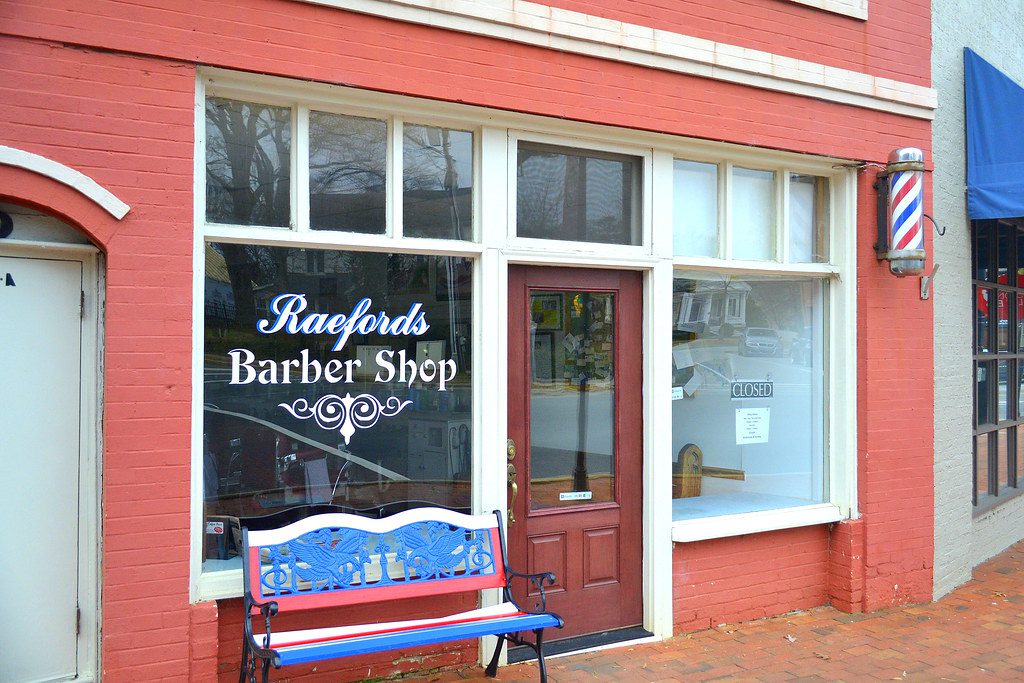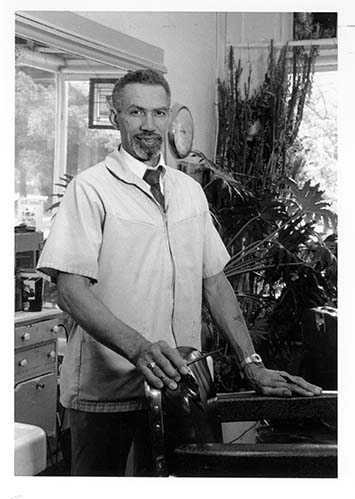
Plans
For years, I thought I would someday become an old-fashioned barber. I would have a little shop on Main Street in a sleepy community, maybe a college town. The shop would have one barber’s chair, four or five chairs for those waiting, and several current newspapers and magazines for clients to read. I would offer haircuts and shaves at a reasonable price, only take walk-ins, and have free coffee and Cokes available to anyone who stopped by. My shop would be as much a hub for visiting with neighbors and talking about things that matter—such as politics, religion, books, and baseball—as a place to be coiffed. Most importantly, you could come as you are, with “bed head” or “hat head,” and read the newspaper, sip coffee, visit with other customers, or even doze off if you felt the need.
Guides
His name was Mr. Kenneth Norton, and he wooed me to his craft in 1986. It was my first year of college in Davidson, North Carolina. As far as I know, Norton—that’s what he asked us to call him—owned and operated the only barbershop in town, located directly across the street from the college. A local icon, Norton had cut the hair and shaved the faces of Davidson College students and other townsfolk for four decades, since 1942, and going to see him was both a step back in time and a rite of passage for many students. When I close my eyes, I can still smell Clubman aftershave colliding with baby powder, the result of Norton’s soft boar’s-hair brush touching the top of my ears and my neck, which stung after he shaved it with a straight razor. To borrow a term from the psychologist Erik H. Erikson, a visit to Norton’s provided me with a sense of at-homeness in the world, of feeling significant and being cared for in the right place.
Norton was a masterful storyteller and he only knew how to cut hair one way. Short! I’m talking semi-buzz cuts in the era of big hair and mullets; we called it being “Nortonized.” To step foot in his shop was to accept the fact that you would not need another haircut for quite some time; the only way to avoid this outcome was not letting him tell a long story, because he cut your hair until he finished telling the tale. If he had been a poet, think in terms of wanting to hear him recite a haiku as opposed to the Iliad.
Short hair notwithstanding, Norton made you look cool. But his vocation took hold of me because he seemed so content with what he did, so well-suited for his craft, and he earned a living making meaningful contributions to people’s lives in a place that smelled good. Felt good. As an 18-year-old, I had no clue what I wanted to do with my life, but I had a sense of wanting a similarly satisfying path. I also decided that whatever I ended up doing, and however long I did it, retiring to the barbershop and “Allanizing” people should remain in my plans. As my wife Tracey will attest, for decades I spoke of this plan fairly often.
Home
But sometimes, plans change. Parkinson’s hands and barbering are not a natural fit. Still, I enjoyed imagining the barber life for years and I admired those who claimed it for themselves.
Jayber Crow, novelist Wendell Berry’s character who also happens to be a barber, says, “The music, while it lasted, brought a new world into being.” [1] The music continues for me, with as much volume and tempo as ever, albeit in a different tune; and the world of the long-anticipated barbershop community has been replaced with the Parkinson’s community and its world.
It turns out that they are not so different.
Both worlds offer opportunities for connection, friendship, laughter, telling stories, sharing burdens, and talking about things that matter. In both places, you can come as you are, stay for a while, and feel welcomed, valued, cared for, and even cool, regardless of how you look or move.
We do not know what will become of our plans or what worlds we will live in, and I find this true whether we are in our 20s, 50s, or beyond. Sometimes the unexpected worlds discovered turn out to be where we live more contented than we thought possible, surrounded by people and experiences that matter to us, and where, despite our lives and plans changing, we can feel at home.
__________
*Norton’s is now Raeford’s Barbershop
[1] Wendell Berry, Jayber Crow (Berkeley: Counterpoint, 2001), 128.
Photo of Kenneth Norton: Davidson College Archives
Allan Cole is a professor in The Steve Hicks School of Social Work at The University of Texas at Austin and, by courtesy, a professor of psychiatry and behavioral sciences at the Dell Medical School. Diagnosed with Parkinson’s in 2016, at the age of 48, he serves on the Board of Directors at Power for Parkinson’s, a non-profit organization that provides free exercise, dance, and singing classes for people living with Parkinson’s disease in Central Texas, and globally via instructional videos. He also serves as a Community Advocate for ParkinsonsDisease.net, and as a regular guest contributor to the Michael J. Fox Foundation’s Team Fox Blog, writing columns about living well with Parkinson’s. He is the author or editor of 10 books on a range of topics related to bereavement, anxiety, and spirituality. His latest books, Counseling Persons with Parkinson’s Disease (Oxford University Press) and Discerning the Way: Lessons from Parkinson’s Disease (Cascade), will be published in 2021. He is also working on a book of poetry titled In the Care of Plenty: Poems (Resource Publications), which will be published in 2022. Follow him on Twitter @PDWise.
